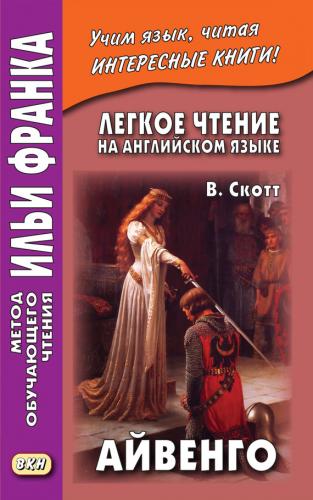edge [edʒ], obvious [‘ɔbvɪǝs], outnumber [aʋt’nʌmbǝ], unfair [ʌn’feǝ]
At the edge of the lists, he turned his horse around again and fought against all three knights with his sword. It was obvious to everyone, however, that he was outnumbered and would be defeated very soon. The noblemen around Prince John agreed that this was unfair and asked the Prince to signal the end of the tournament.
“No, by the light of Heaven (нет, клянусь светом небес; by – зд. употребляется в формулах клятв, обещаний с глаголом swear /клясться чем-либо/, а также во фразах с опущенным глаголом)!” replied Prince John (ответил принц Джон). “This knight who hides his name (этот рыцарь, который скрывает свое имя; to hide – прятать, скрывать) has already won one prize (уже выиграл один приз). Now he should let others have their turn (теперь ему следовало бы позволить другим выиграть: «получить свое»; turn – оборот; очередь)!”
During the battle in the lists that day (во время сражения на ристалище в тот день; during – в течение, в продолжение; во время), there had been a knight in black armour (был один рыцарь в черных доспехах) on a strong black horse (на сильном вороном коне; black – черный; вороной /о лошадях черной масти/) who had started on the side of the Disinherited Knight (который начал битву на стороне рыцаря Лишенного наследства).
heaven [‘hev(ǝ)n], reply [rɪ’plaɪ], turn [tǝ:n]
“No, by the light of Heaven!” replied Prince John. “This knight who hides his name has already won one prize. Now he should let others have their turn!”
During the battle in the lists that day, there had been a knight in black armour on a strong black horse who had started on the side of the Disinherited Knight.
He seemed to take very little interest (казалось, что он был очень мало заинтересован; to take interest – интересоваться, проявлять интерес) in what was taking place in the lists (тем, что происходило на ристалище) and carefully avoided fighting anyone himself (и старательно избегал сражений: «сразиться с кем либо» сам; to avoid – избегать, остерегаться, сторониться, уклоняться). The audience thought he was being very lazy (зрители сочли, что он был очень ленивым; to think – думать, мыслить; полагать, считать, иметь мнение) and called him the Black Sluggard (и прозвали его Черным Бездельником; to call – кричать, окликать; называть, давать имя; sluggard – бездельник, лентяй, лодырь, тунеядец, лежебока; sluggard – ленивый; вялый; медленный, неторопливый).
carefully [‘keǝf(ǝ)lɪ], avoid [ǝ’vɔɪd], sluggard [‘slʌɡǝd]
He seemed to take very little interest in what was taking place in the lists and carefully avoided fighting anyone himself. The audience thought he was being very lazy and called him the Black Sluggard.
Suddenly, however, when he saw (внезапно, однако, когда он увидел) that the leader of his side was outnumbered (что предводитель его стороны /отступает/ под превосходящими силами противника), he shouted (он закричал), “Desdichado, to the rescue! («Desdichado, /иду/ на выручку!»; rescue – спасение /жизни/, освобождение; to come to the rescue – приходить на помощь
Конец ознакомительного фрагмента.
Текст предоставлен ООО «ЛитРес».
Прочитайте эту книгу целиком, купив полную легальную версию на ЛитРес.
Безопасно оплатить книгу можно банковской картой Visa, MasterCard, Maestro, со счета мобильного телефона, с платежного терминала, в салоне МТС или Связной, через PayPal, WebMoney, Яндекс.Деньги, QIWI Кошелек, бонусными картами или другим удобным Вам способом.
